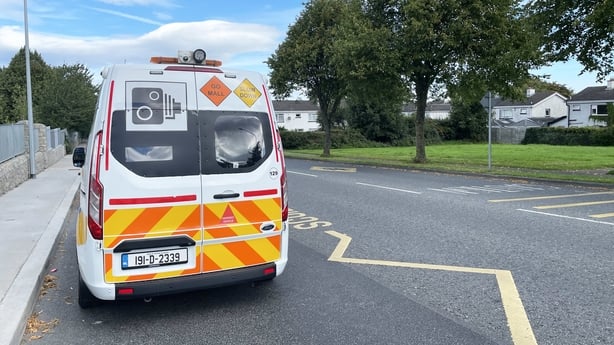Some 184 people were killed on Irish roads in 2023, according to the Road Safety Authority (RSA).
Last year saw the highest number of fatalities in almost a decade, after 192 people lost their lives on the roads in 2014.
The figures represent a 19% increase in road deaths compared to 2022.
Road fatalities fell during the pandemic, with 136 deaths in 2021 and 146 in 2020.
RSA Chairperson Liz O'Donnell said "we must do more".
"I welcome the proposed introduction of a national strategy on camera-based enforcement which, I understand, will be prioritised in 2024," she said.
"A national strategy will ensure a consistent approach to the selection and use of the different forms of camera technologies as well as supporting the development of a roadmap for the rollout of camera-based enforcement and ensuring that enablers such as funding and other critical resources are identified."
Of the 184 road deaths in 2023, 69 were drivers, 44 were pedestrians, 34 were passengers, 26 were motorcyclists, eight were cyclists and three were e-scooter users.
The counties that recorded the highest number of deaths were Tipperary (16), Dublin (15), Cork (15), Galway (13) and Mayo (12). These accounted for 39% of the total fatalities.
This year's figures reveal a high proportion of male fatalities, a continuation of 2022's increased level of pedestrian fatalities and a high number of fatalities taking place at night when there is less traffic on the roads.
In 2023, 78% of fatalities were men (144) and 22% (40) were women.
There were 44 pedestrian deaths, which is one more than in 2022.
The last time there was a higher number of pedestrian fatalities was in 2011 (47).
Almost half of fatalities occurred between 8pm and 8am, compared with 35% in 2022, despite lower traffic volumes during these hours.
Over a quarter of fatalities were aged 16-25 years, compared with 16% in 2022.
Almost half (46%) of fatalities occurred between Friday and Sunday.
We need your consent to load this rte-player contentWe use rte-player to manage extra content that can set cookies on your device and collect data about your activity. Please review their details and accept them to load the content.Manage Preferences
Chief Executive of the RSA Sam Waide, said: "Weekends, late nights and early mornings have been high-risk periods throughout the year.
"Despite lower traffic volumes, these timeframes feature high numbers of collisions. The evidence suggests that these periods present greater risks in terms of driver behaviours like drink and drug-driving and fatigue.
"We are targeting these behaviours with new awareness and education initiatives, such as the Say It campaign which commenced two weeks ago."
In Northern Ireland, 70 people died on the roads in 2023, an increase from 54 in 2022 and 50 in 2021.
The Department for Infrastructure in Northern Ireland and the PSNI have issued a joint safety appeal urging all road users to share the responsibility for road safety in 2024.
Campaigner urges increase in number of gardaí policing roads
Susan Gray, from PARC Road Safety Group, has called for more gardaí to be deployed to road safety enforcement, saying the number has decreased over a number of years.
"We have only 641 members in the Roads Policing Units, down from over 1,000 in 2009.
"We had 47 members taken from our Roads Policing Units this year [2023] alone," she said.
Asked about the number of gardaí in Roads Policing Units, the Department of Justice said that "all frontline gardaí contribute" to the enforcement of road safety.
In a statement, the department said: "It is important to note that while a number of Gardaí are assigned to Roads Policing Units, all frontline Gardaí contribute to policing our roads and keeping them safe.
"On average 25% of roads policing enforcement is carried by regular members, with the exception of drug/drink driving checks, 75% of which are carried out by regular members.
"The Garda Commissioner is responsible for the administration and management of An Garda Síochána, including the allocation of personnel among the various Garda Units.
"Garda management assures that the distribution of resources is kept under continual review in the context of crime trends and policing priorities.
"The Government are committed to providing the funding needed to continue to ramp up Garda recruitment. Budget 2024 provides for 800-1000 new Garda recruits.
"Growing the strength of An Garda Síochána to 15,000 and beyond will allow the further expansion of specialist units, including the roads policing unit".
Almost 90,000 garda checkpoints in 2023
The Garda National Roads Policing Bureau conducted over 87,700 checkpoints last year.
Some 7,707 people were arrested on suspicion of driving under the influence of an intoxicant.
In the region of 200,000 speeding offences were detected.
Over 5,300 fixed penalty notices were issued for not wearing a seatbelt and more than 18,800 motorists were fined for using their mobile phone.
Chief Superintendent Jane Humphries said: "These figures demonstrate that, while the majority of road users support our collective work to keep people safe by adhering to the rules of the road, there are still plenty that need to reflect on their driving behaviours.
"There is room for improvement. As we head into 2024, we must all pay close attention to our collective responsibility to make Irish roads safer and to reduce the number of lives lost and people seriously injured in road traffic collisions."

A woman in her late 80s died following a two-car collision in Co Roscommon yesterday evening.
Gardaí and emergency services were alerted shortly before 5pm after two cars collided on the N4 at Doon near Boyle in Co Roscommon.
The woman - the driver of one of the cars - was pronounced dead at the scene.
Additional reporting Moira Hannon






